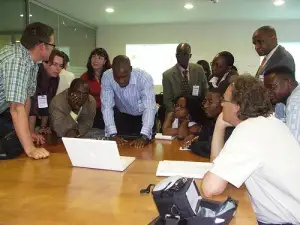web2fordev conference impressions (1)
 Unfortunately, I did not have the opportunity to blog during the web2fordev conference. Organization work was more than what I expected, and of course there were so many interesting people to talk to around, I just couldn't let go. Favourably, we got about 50 blog posts mainly from our journalists, who came from different African countries, and who of course did a great job reporting. Now some sessions can be watched completely over video (unfortunately only Internet explorer though). The week started with an interesting web taster day, and went through many more topics ending the week, yesterday, with a farmer led documentation workshop from Dorine Rüter. Interesting cases were presented, of how farmers in Africa use digital cameras to document and create awareness of their problems in order to help each other. Let me now summarize impressions from theses days at the FAO in Rome.
Unfortunately, I did not have the opportunity to blog during the web2fordev conference. Organization work was more than what I expected, and of course there were so many interesting people to talk to around, I just couldn't let go. Favourably, we got about 50 blog posts mainly from our journalists, who came from different African countries, and who of course did a great job reporting. Now some sessions can be watched completely over video (unfortunately only Internet explorer though). The week started with an interesting web taster day, and went through many more topics ending the week, yesterday, with a farmer led documentation workshop from Dorine Rüter. Interesting cases were presented, of how farmers in Africa use digital cameras to document and create awareness of their problems in order to help each other. Let me now summarize impressions from theses days at the FAO in Rome.
Inclusion Seen by many people just as a technology, the web2fordev conference proved to me -once again- that people are more minded and complying when gathered together for so-called web2.0. The conference--even with the official and formal character it has within the FAO headquarter--got a neat unconference character; as the the director of FAO communication said at the end, "This halls have not seen this kind of event before." It was a good mixture of people from many different backgrounds. There could have been more activists and pioneers in my opinion, but the conference fortunately attracted many people from all around the world.
Patience Through the days, I felt again that we are still at the bottom or ground work of the using web2.0 for development. Many participants had just started experimenting with blogs, etc. by themselves, and had an understandable difficulty to grasp web2.0 in all its dimensions. Therefore, some discussions went not as deep as I wished, but the different perspectives were valuable. There was often a mixture of scepticism and enthusiasm. Will wikis make sense one day? How much trust do we need to place on wikis , and can we even establish that only virtually? Where is the audience for blogs and how can I filter all that information? That way, on one side, participants helped each other to make sense of all these tools, and on the other, sophisticated database RSS models were presented by Thierry Helmer or Thomas Metz. I wonder how can we cope with the challenge of having so many tools developed in such a short time? Many people are certainly not disposed or cannot follow.
Web2.0 in the field The conference showed me clearly that a lot has been done in and between organizations. That is where the potential and the easiest implementation lies. There are a few projects in developing countries that have not yet implemented web2.0, but unless obvious challenges are not bridged, it will be difficult to implement more. It was, therefore, helpful and quite realistic to hear from Moses Kisembo and Kado Muir that blogs and wikis are not seldom light-years away from what is needed in Uganda or Nigeria. Nevertheless, bloggers such as Prince Deh from Ginks show how important this pioneer work can be. One high hope at the conference, which was often mentioned, was the mobile phone. Some presentations had in my opinion more of traditional web approach, but there were also many exceptional interesting cases such as Brosdi .org, which is supported by Bellanet. Market information systems and knowledge sharing via questions and answers (e.g. audioblogging from India) were the strongest examples in terms of rural development. One major success factor was that it has a benefit for the community, and in that way they are willing to contribute.
Please check the web2fordev blog for more information. There have been 50 posts written around the conference. Nynke Kruiderink and I give a little interview on tagging.